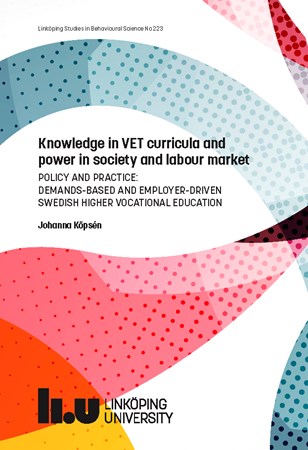This research project focus on vocational education and training (VET) at tertiary level. In Sweden, Higher Vocational Education (HVE) allow adult students to further or change their careers through an educational type where programmes only are given if there is an explicit demand from employers pledging their needs and involvement. This means that there is a close, albeit compulsory, relation between education and employers giving the HVE and its' programmes a distinctive character, setting it apart from other educational types in the Swedish public school system.
The project entails a study of knowledge in VET, the circumstances for its selection and transmission and how these circumstances are shaped by both national policy and local organisation.
The study is set within the Swedish state-funded HVE and it entails investigations into both national policy and local practice in programme provision. It covers a variety of data, including policy documents, interviews with personnel responsible for the training and observations of meetings for cooperation between schools and local employer representatives. Based on the findings, this study problematises and discusses system formation, knowledge in curricula, the organisation of programme provision, and employer involvement generally in VET and specifically in Swedish HVE. The investigations and discussions are positioned within a perspective that questions the organisation of education and knowledge in relation to the distribution of power in society and the social order of capitalism and neoliberal policies. This perspective is based on Bernsteinian theory, that also functions as the interpretative framework for the study’s theoretically guided thematic analysis.
Findings showcase that the Swedish HVE system is in line with global trends of distinctive vocational pathways in higher education, marketisation of training and governments shaping systems with significant influence for employers which risks students being locked into pre-defined positions with employers in the local labour markets.
Funding: Linköping University



